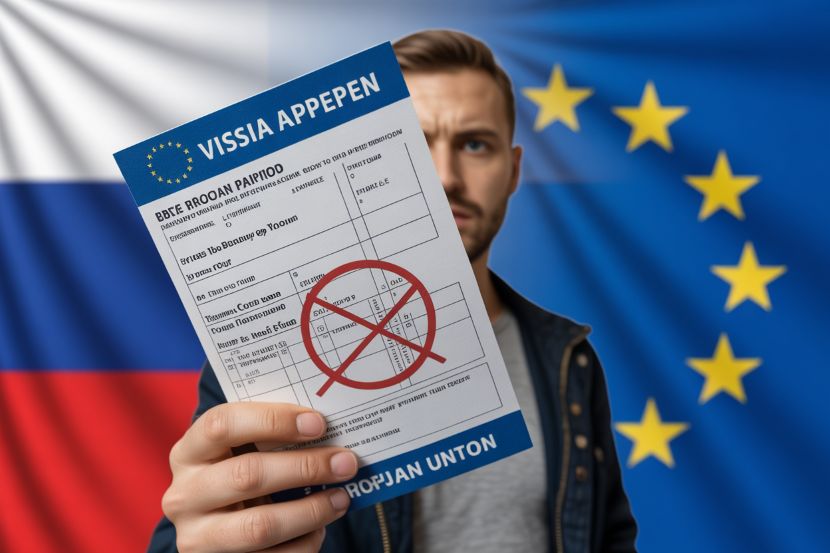Published on
November 8, 2025
In a significant shift, Russian nationals will face stricter travel rules when visiting the European Union as the Schengen Area implements new visa policies. This move comes amid growing security threats linked to the ongoing war in Ukraine, leading to the suspension of multiple-entry Schengen visas for Russian citizens. The new restrictions mean that travelers from Russia will now only be eligible for single-entry visas, which must be reapplied for each time they plan to visit any of the 27 countries within the Schengen zone.
This policy change, which took effect on November 7, 2025, comes after months of internal discussions and is part of a wider European strategy to tighten border controls in response to what officials describe as rising security risks. As a result, Russian tourists, business travelers, and even those with non-EU residence permits will have to navigate more administrative hurdles, with additional costs and waiting times for each trip.
Increased Visa Restrictions for Russian Nationals
The European Commission’s decision to stop issuing multiple-entry visas to Russian citizens marks a new chapter in the EU’s response to the ongoing conflict in Ukraine. Under the new visa rules, Russian nationals will need to apply for a separate visa every time they plan to enter the Schengen Area. This change is a significant departure from previous policies where multiple-entry visas were issued, allowing travelers to visit the EU multiple times within a given timeframe without needing a new visa for each trip.
While the new policy doesn’t amount to a total travel ban, it severely limits the ease of access for Russian nationals, particularly those who frequently travel to European destinations such as Germany, Italy, France, and Spain. The shift also comes as a response to what many EU officials are calling a heightened security threat, including espionage, cyber-attacks, and potential infiltration efforts.
Implications for Russian Tourists and Business Travel
For Russian tourists, the change represents a substantial inconvenience. The need to apply for a new visa for each trip will lead to longer waiting times, increased application costs, and a greater administrative burden. According to official figures, Russian nationals were issued over 500,000 short-stay Schengen visas in 2024, marking a sharp decline from the 4 million visas issued in 2019, before the onset of the war in Ukraine.
This policy could also have a dampening effect on tourism-related activities in Europe. Countries like Finland, Estonia, and Latvia—which have long been popular gateways for Russian travelers—are likely to experience a drop in the number of visitors from Russia. Although these countries have supported stricter visa policies, the increased cost and difficulty in obtaining travel documents may make leisure and business travel from Russia to Europe much less feasible.
What Travelers Should Expect Under the New Visa Rules
Traveling to Europe will become increasingly complicated for Russian nationals, with more paperwork and longer waiting periods. However, there are still potential exceptions under the new regulations. For humanitarian reasons, certain individuals—such as journalists or human rights defenders—may still be able to apply for multiple-entry visas, although these exceptions are expected to be rare.
Here’s what Russian travelers should do to avoid complications:
Plan ahead: Be prepared to apply for a new visa each time you intend to visit the EU. Ensure all documentation is in order and expect longer processing times.Consult official visa guidelines: Keep an eye on any updates from EU embassies or consulates regarding the specifics of the new regulations.Consider alternatives: If frequent travel to Europe is essential, it may be worth exploring other visa options or destinations outside the Schengen Area for business or leisure purposes.Tourism and Travel Industry Impact
The decision to halt the issuance of multiple-entry visas will have a moderate economic impact on the EU tourism industry, particularly in countries on the EU’s eastern borders. Regions with a history of strong tourism ties to Russia, such as Finland and the Baltic states, may see a sharp reduction in Russian visitors, which could result in losses for local businesses that rely on this market.
Moreover, Russian nationals residing outside the EU will face additional challenges. Those who hold non-EU residence permits and need to travel back to Russia or visit neighboring countries could find themselves caught in the new visa restrictions, complicating their ability to move freely across borders.
Broader Geopolitical Ramifications
The EU’s visa policy change is not just about tourism; it is also a response to growing geopolitical tensions. The European Union has been increasingly using its visa system as a foreign policy tool, reflecting the escalating concerns over Russia’s role in global security. The new visa restrictions are part of a larger package of sanctions and security measures aimed at countering Russian hybrid threats, such as cyberattacks, disinformation, and other subversive activities aimed at destabilizing EU member states.
In addition, there are reports of Russian nationals attempting to enter the EU under false pretenses, further prompting the EU to act more decisively in controlling who can enter the region.
What Does This Mean for Russian Travelers?
With the new visa rules, travel to Europe for Russian nationals will undoubtedly become a more complex and costly process. While business travelers and tourists are still allowed entry under the new rules, they must now contend with additional paperwork, increased visa costs, and lengthened wait times.
Travel agencies and businesses catering to Russian clients have raised concerns that this policy could render travel to Europe “impractical” for many. Individuals who regularly travel for leisure or business will find the new rules burdensome, and those who have non-EU residence could face even more logistical challenges.
For now, Russian nationals who wish to visit Europe need to stay informed about the latest developments and be prepared for the extra challenges that the new visa rules present.
